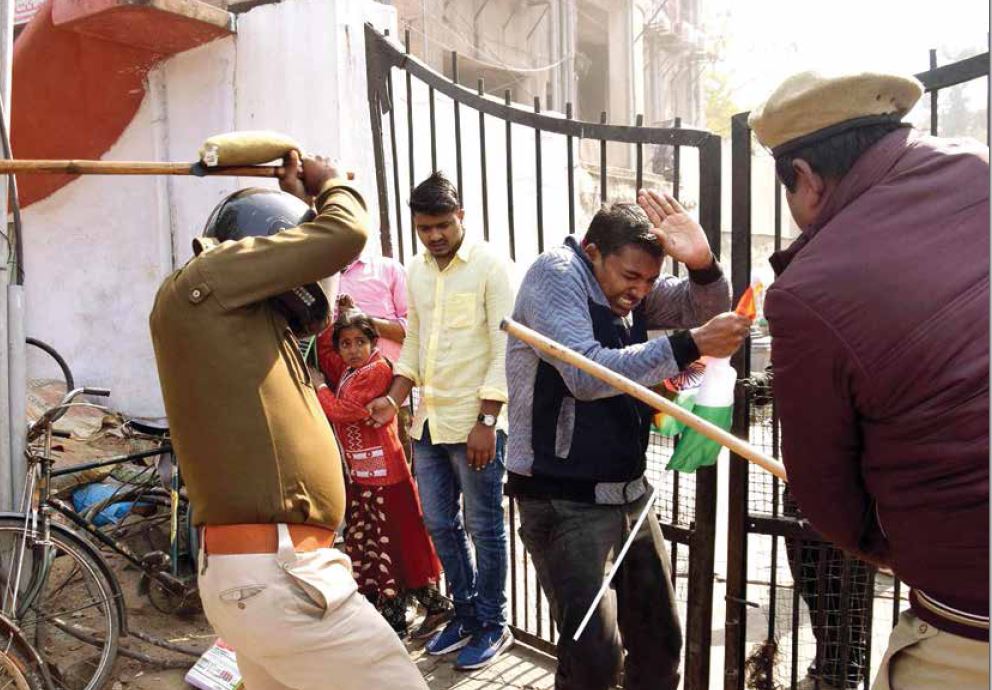Mob violence justified in cases related to ‘national security’ and ‘cow-related crimes’, torture justified in ‘serious’ criminal investigations feel a significant section of India’s police officers. In cases of sexual harassment and child-lifting/kidnapping this support for mob violence is at 27% and 25% respectively.
Violent punishment by mobs to the suspects of cow slaughter was justified to either a “great” or “some” extent. Close to two in every five respondents –police personnel surveyed across 18 states — (that is a 38% of the total of 8,276 subjects) also believed this, that violent punishment by mobs to “suspects of cow slaughter” was somewhat justified. This is similar to the finding from a previous survey of police personnel published in the Status of Policing in India Report 2019 where a similar question was asked about their support for mob violence in cases of cow slaughter—35 percent of police personnel justified such mob violence (15% “to a large extent” and 20% “to some extent”) (SPIR, 2019). More than a quarter of the police personnel surveyed (see details below), who from IPS-level ranks supported mob violence to a great degree (Figure 2.8, Table 2.8)
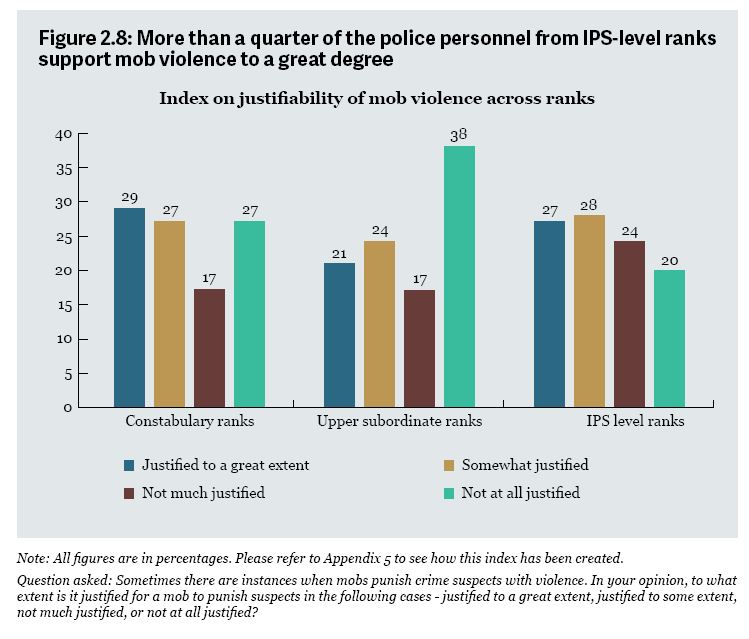
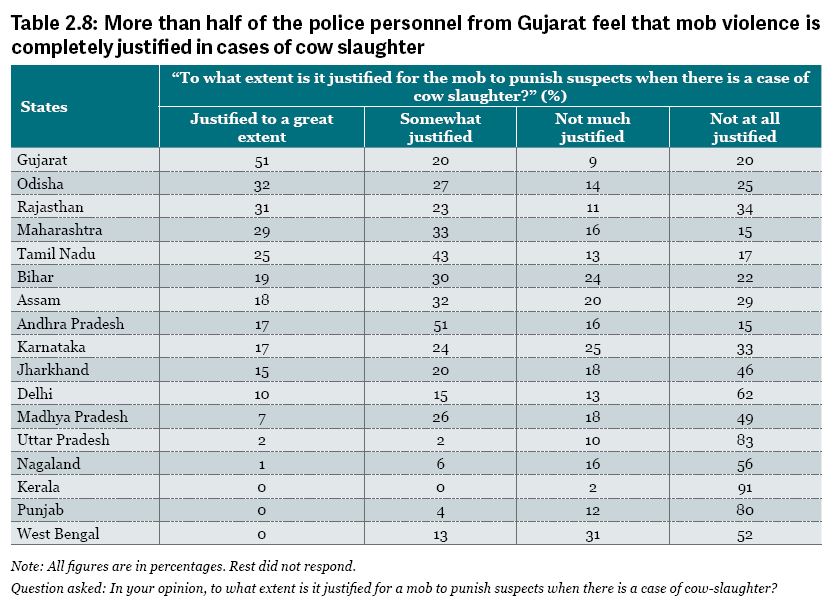
These are only some of the worrying findings from a recent study on the ‘Status of Policing in India Report’ (SPIR 2025) conducted by Lokniti, Centre for the Study of Developing Societies in collaboration with Common Cause that read together, shed light on this grim reality. The study, which analysed responses from 8, 276 police personnel across 82 locations in 17 States including Delhi, provides insights into the culture of abuse behind closed doors.
When asked if it is acceptable for the police to use violence against suspects of serious offences for the greater good of society, nearly two out of three police personnel (63%) surveyed, agreed. Of them, 22% strongly agreed and 41% moderately agreed. A notable 35% of the officers opposed the idea. Support for violence against suspected serious offenders remained consistent across ranks.
When surveyors asked policemen and women about torture, a significant number of police personnel expressed strong support for its use in interrogations across various crime categories. The highest support was for cases related to national security, such as terrorism, with 42% strongly backing torture. Over a third (34%) also strongly supported its use in cases of rape, sexual assault, and serious violent crimes such as murder (Table 2.6). Additionally, 28% strongly agreed that torture must be used against history-sheeters.
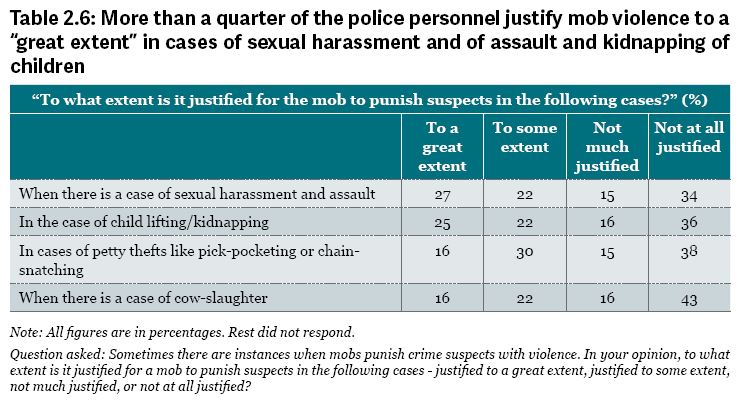
Mob violence involves targeted acts of violence perpetrated by a large group of individuals who perceive that they are administering punishment to a suspected wrongdoer, bypassing the rule of law entirely. It is very alarming that such a significant proportion of police personnel justify mob violence. For law enforcement officers to support open violence which entails suspension of the law itself, as a means of delivering so- called punishment to a person, is an absolute negation of the constitutional oath they swear to uphold. Similar to the support shown by police respondents to impermissible measures towards crime control, this significant support for mob violence signals police propensities towards violence and unbridled power. Incidents of the police not only overlooking such violence, but their active complicity have been reported on multiple occasions.[1]
Among other key findings in the over 200 page study are that
- One in 10 police personnel believes that couples displaying affection in public places should be detained!!
- More than half of the police personnel believe that hijras/transgenders/ homosexual people are a bad influence on society and the police need to deal with them strictly.
- Police personnel strongly support the use of more preventive arrests of ‘anti-social elements’ (48%) and forming special squads that can detain people indefinitely (43%). Both measures disregard legal standards.
- Twenty-percent of the police personnel feel that it is very important for the police to use tough methods to create fear amongst the public, another 35 percent think it’s somewhat important.
- One in four police personnel strongly justify mob violence in cases of sexual harassment (27%) and child lifting/kidnapping (25%). Across various categories of crime, constabulary and IPS officers are the most likely to justify mob violence, and upper subordinate officers are the least likely to do so. Police personnel from Gujarat showed the highest support, while those from Kerala showed the least support for mob violence.
- Twenty-two percent police personnel feel that the rich and powerful are “naturally prone” to committing crimes to a great extent, and 18 percent feel that Muslims are “naturally prone” to committing crimes to a great
- The survey was conducted across 17 states and UTs. State-level trends mirrored the all- India findings of the highest number of arrests in minor offences, also falling foul of the law. Police personnel in Odisha reported the highest proportion of arrests (46%) for the crimes of theft and extortion, followed by Nagaland (38%) and West Bengal (37%). The data further shows that police respondents from Punjab (60%) reported the most arrests – that is, six in every ten – against the crime of loitering and public nuisance, distantly followed by Nagaland and Maharashtra (29% and 25% respectively)
- The police responses also reveal that the highest proportions of arrests conducted for bodily crimes (such as murder, assault and kidnapping) were reported in Assam (30%), closely followed by Gujarat (28%), Maharashtra (26%) and Jharkhand (26%). Further, as per the survey, police personnel from Uttar Pradesh (UP) reported the highest proportion of arrests (25%) for crimes against women, followed by West Bengal, Jharkhand, and Madhya Pradesh in equal proportions (22% each). In terms of arrests, the official data corresponds with the survey finding that the highest proportion of arrests for crimes against women was made in UP (1,01,754, as per Crime in India 2022).
- Almost half of the police respondents believed that mob violence was justified to either “a great extent” or “some extent” in the cases of sexual harassment and assault (49%), child lifting or kidnapping (47%) and petty theft like pick-pocketing or chain-snatching (46%).
As was evident in studies conducted in previous years, anti-Muslim bias is high among police personnel with the corresponding disregard for due process and justification for mob violence. In keeping with attitudes towards contempt for due process (preventive detention, procedure during arrests), coercion (torture, a large section of policemen and the officers of law enforcement agencies appear to have communal bias in their perception about Muslims, who they believe are “naturally prone” towards committing crime to a great extent. This is yet another finding of the “Status of Policing in India Report-2025” (SPIR), released in New Delhi recently, which has pointed to a clear display of prejudices among the police personnel.
In this extensive survey and analysis, the SPIR-2025 has explored the nature, causes and factors that contribute to the perpetuation of police violence and torture in the country. It seeks to understand the police’s attitudes towards torture and the normalisation of its use and includes the perspectives and experiences of other accountability actors, such as doctors, lawyers, and judges.
Previous studies may be read here and here.
In the study, a large number of police personnel in Delhi, Rajasthan, Maharashtra and Gujarat believe that Muslims have been analysed as naturally prone towards committing crime to a great extent. One in every five (19%) among the Hindu police personnel feels that to a “great extent”, Muslims are naturally prone to commit crimes, while one-thirds (34%) feel the same to “some extent”, while Sikh police officers were least likely to hold this opinion.
Out of the surveyed states, more than two-thirds of the police personnel in the states of Rajasthan (70%), Maharashtra (68%), Madhya Pradesh (68%), West Bengal (68%), Gujarat (67%) and Jharkhand (66%) held the opinion that the Muslim community is likely to be naturally inclined to committing crime to either a “great” or “some” extent. Police personnel from Delhi (39%) were most likely to believe that Muslims are naturally prone to committing crimes, followed closely by Rajasthan (35%), Maharashtra (34%) and Gujarat (34%).
The study also found that caste, religion, and political affiliation often play a decisive role in shaping the outlook of the police perception and influencing their actions. This bias not only shapes initial interactions but can also affect decisions on investigation, enforcement, and legal proceedings. The report according to the parameters of the study published in the report, surveyed a broad spectrum of law enforcement personnel, including constables, upper subordinate officers ranging from assistant sub-inspectors to deputy superintendents of police, and senior officials from the Indian Police Service (IPS).
The SPIR-2025 pointed out that Muslims are identified as one of the marginalised communities which are common targets of torture. Academic scholarship cited in the report suggested that torture tactics employed by the police against Muslim men suspected of terrorism deliberately target their religious identity and masculinity to humiliate the entire community.
Police respondents in states with harsh cow slaughter laws, such as Gujarat, Odisha, Rajasthan, and Maharashtra, showed high support for mob punishment in such cases. Besides, despite a significant proportion of police personnel believing that Muslims are predisposed to crime, a considerable percentage also perceive that Muslims are likely to get justice to a “great extent”.
Meanwhile however, the study also cautions that these are the police’s perceptions, which may be marred by pre-existing biases and could be contrary to the lived realities of Muslims. Independent analysis of prison statistics indicates the over-incarceration of Muslims, suggesting potential biases within the criminal justice system.
Disregard for due process
The report also highlights a significant disregard for the rule of law among a notable section of the police. Nearly one-third (28%) of police personnel believe the criminal justice system is too weak and slow, with a preference for extrajudicial measures over due process. Alarmingly, almost two out of five (38%) feel that for minor offences, police should give minor punishment instead of following legal trials.
One in four police personnel strongly justified mob violence in cases of sexual harassment (27%) and child lifting or kidnapping (25%). This suggests that about a fourth of India’s police personnel support the idea of the mobs acting as the judge, jury and executioner in matters they consider grave.
Across various categories of crime, constabulary and IPS officers are the most likely to justify mob violence, and upper subordinate officers are the least likely to do so. Police personnel from Gujarat showed the highest support, while those from Kerala showed the least support for mob violence.
Ignorance, lack of compliance for legal procedures
There also appeared to be a lack of compliance towards arrest procedures across states, according to the study. Only 41% of police personnel said these procedures were “always followed”, while 21% admitted to “rarely” or “never” complying with them. Karnataka fared the worst, with a staggering 70% of its officials acknowledging they “rarely” or “never” follow prescribed procedures, while Kerala police demonstrated the highest compliance, with 94% of officials adhering to proper arrest protocols.
Gujarat: high bias against marginalised
In Gujarat, police exhibited the highest level of bias in their perception of Dalits and Adivasis, who they believed were “naturally inclined to commit crimes”. Among its personnel, 68% hold this view about Dalits, while 56% believe the same about Adivasis. Among Delhi’s police, which comes under the jurisdiction of the Ministry of Home Affairs, a worrying 62% believe that Muslims are more “naturally inclined” towards crime.
About 30% of police personnel said that ‘third-degree methods’ are justified towards the accused in serious criminal cases, while 9% said they are justified in petty offences. IPS officers and those respondents who often conduct interrogations are the most likely to justify the use of third-degree methods. Besides, 11% of the police personnel feel that hitting or slapping family members of the accused is absolutely justified, and 30% said that it is sometimes justified.
Interviewees said that the victims of torture are mainly people from poor and marginalised communities. A lawyer described it as “all the faceless and voiceless” are targeted. The following groups are the common targets of torture: Muslims, Dalits, Adivasis, people who cannot read and write, and slum dwellers.
The report concluded with a strong call for strengthening institutional safeguards and fostering a greater commitment to the rule of law within the police force. It recommended more active engagement and interaction between Judicial Magistrates and arrested persons, along with ensuring medical examinations during custody. The study also underscored the urgent need for more comprehensive and consistent data collection on police torture and custodial violence.
How the police view and even justify custodial torture
Police personnel were also asked how justified is the use of certain coercive and violent acts towards the accused so that criminal cases can be solved. The data reveals a troubling acceptance of coercive tactics, ranging from verbal abuse and threats to slapping and third-degree methods. Nearly
Almost half (49%) said that verbally abusing or threatening suspects in cases of minor offences such as theft is justified, with 32% endorsing slapping and 9% even supporting the use of third-degree methods. Support for such violent methods increased dramatically in cases of serious crimes. Three in ten (30%) police personnel justified third-degree methods in cases such as rape and murder, while half (50%) approved of slapping suspects and more than half (55%) endorsed verbal abuse or threats.
Threats and slapping or using light force are common. About a quarter (26%) of police personnel said that suspects are threatened often, while 34% said that this happens sometimes. Similarly, nearly two in 10 (18%) said that slapping or using light force is common, with 28% saying it happens occasionally.
Regarding third-degree methods, one in 10 police personnel admitted that such extreme violence occurs often, and 16% said it happens sometimes. Additionally, one in three respondents reported that investigating officers frequently use coercive tactics.
The findings reveal that close to half, that is nearly four in 10 police personnel believe that reporting of custodial torture should be mandatory, while a similar proportion supported it being mandatory in some cases. Around one in 10 felt it should never be mandatory. While a majority supported mandatory reporting, the fact that the largest group favoured it only ‘sometimes’ suggests a level of hesitation or conditional acceptance. The data also shows that officers at the police station level favour mandatory reporting more than their senior counterparts.
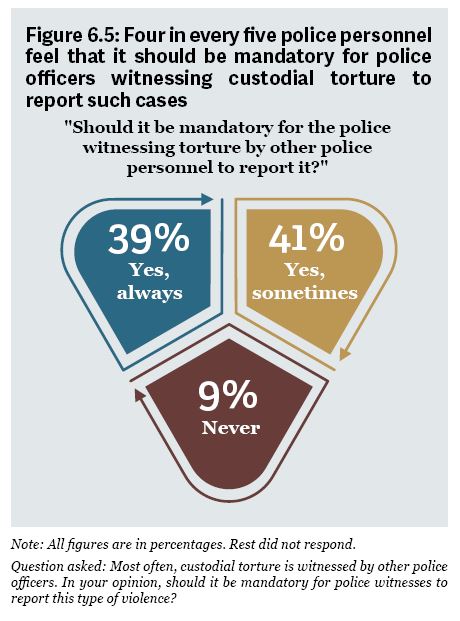
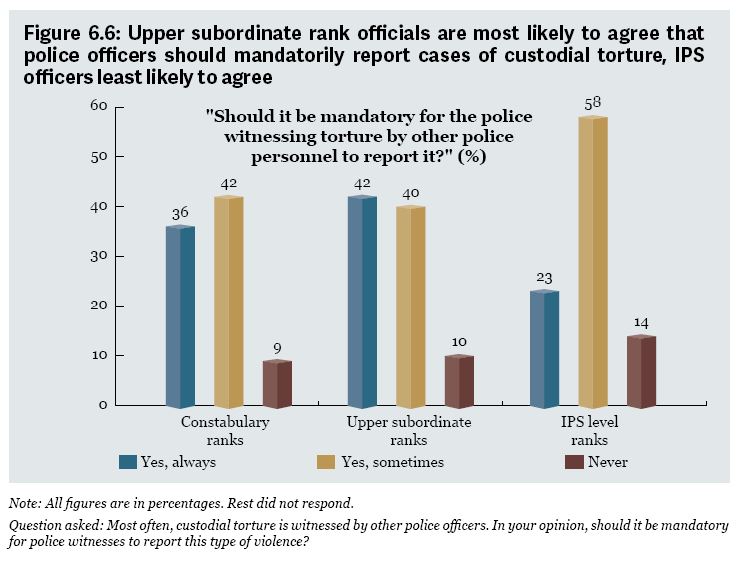
When asked if junior police personnel would feel comfortable fi ling a complaint against their seniors for the use of violence, provided legal protection, over four in 10 of police respondents strongly agreed, while 36% agreed moderately.
Seventy percent of police personnel who have a high propensity to justify torture also believe that training on the prevention of torture is very important. (Table 6.8)
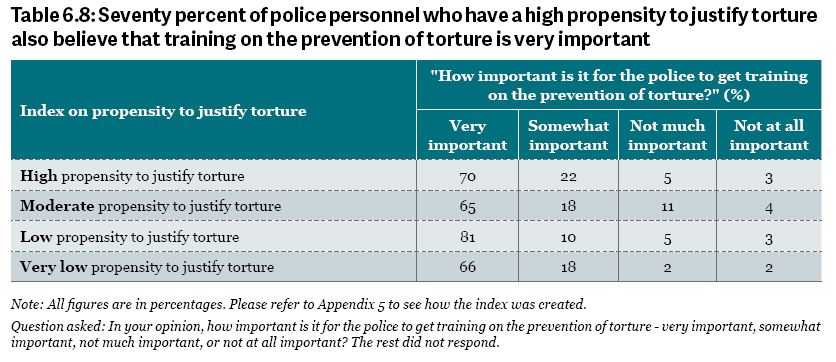
The entire report may be read here
Sabrangindia and Communalism Combat before that, have been assiduously analysing and campaigning around the issue of both representation of Indian Muslims in the police force and administration and also the attitudes of men in uniform Vis a Vis India’s largest minority.
An introduction to the Justice BN Srikrishna Commission Report into the Bombay 1992-1993 brute anti-minority pogrom published an introduction by journalist, educationist and activist, Teesta Setalvad. She has researched the various judicial commission reports into anti-minority violence. This section. Anti-Minority Bias in the Police Force may be read here. Ex-IPS officer, KS Subramanian’s essay ‘Babri Masjid 1992 – Gujarat 2002 – Kashmir 2016: How the Sangh Parivar has wrecked India’s secular social fabric by sustained anti-minority violence’ may be read here.
In February 1995, in the cover story of Communalism Combat (www.sabrang.com) Vibhuti Narain Rai gave an interview that turned the searchlight within, on the Indian Police Force. Setalvad had met him at the National PoliceAcademy where I had been asked to become part of a training given my work in the post Babri-Masjid demolition Bombay violence. In this explosive interview he had argued, cogently and with statistics about the deep-rooted bias within the Indian police. “No riot can continue for more than 24 hours unless the state wants it to continue,” he had said in an interview, that, after it appeared in the February 1995 issue of Communalism Combat was reproduced by 35 Indian publications in different languages. This seminal interview may be read here.
This poor representation of various sections of India’s marginalised, make it almost impossible for the social issues and crimes most plaguing the country today, to be taken seriously by the police. In fact, one witnesses that in many instances the police collude with the majoritarian community, namely Upper caste class Hindu male to perpetuate even more violence on those who are already persecuted.
Though some progressive judgments such as the one in which the SC upholds Karnataka law on Reservations in Promotions for Govt. employees provide a glimmer of hope, the implementation on the ground remains questionable.
[1] See civil society reports on mob lynching that document police apathy and complicity in cases (Citizens Against Hate, 2018 and Human Rights Watch, 2019).
Related:
Anti–minority bias in the Indian Police
Mayhem in Malegaon: A fact-finding team of human rights activists and lawyers that visited riot-hit Malegaon returns with disturbing evidence of a “complete communal-isation of the police and paramilitary forces”
Local Jharkand Police Used Communal Slogans: NCM on Latehar Hangings
Controversy: DIG claims he never said ‘Muslims follow religion of terrorists’

